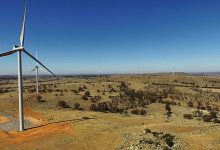Windlab management has told investors that the company’s future may rest with an expansion into the African energy market, after a ‘frustrating’ year in the Australian market, which has seen several of its local projects beset by delays and write-downs.
In a call to investors following the release of the company’s half-year results, Windlab executive chairman Roger Price said that 2019 had been a challenging year for the company, reflecting on both the challenges faced by the company at its own projects, as well as the collapse in new wind and solar investment observed Australia-wide.
“I think it’s fair to say that 2019 was a year of frustration,” Price said. “Characterised by delay across several of our projects. The Kennedy Energy Park has encountered further delays, as advised.”
“Across the Australian market investment in renewable energy has collapsed in 2019, caused by ongoing regulatory uncertainty and dramatic increases the technical process requirements related to grid connection and registration.”
During the call, Windlab senior management talked up the company’s prospects in Africa, where a surging need for new generation capacity provides a much more promising market than that currently available in Australia.
“In South Africa, the need for more generating capacity could not be clearer,” Price said.
“The country is experiencing blackouts and rolling load-shedding caused by the unpredictable operation of its old coal fleet. There is a clear stated intention to procure significantly more renewable energy generation, both from statements made by the president and via the release of the country’s new integrated resource plan, which calls for further 14 gigawatts of wind energy by 2030.”
The company said that there had been strong demand from the African market, with new generation capacity in high demand as economies grow, particularly in South Africa, which has struggled to maintain reliable supplies.
“If called when lab should be well placed to participate as we currently have 640 megawatts of approved capacity across five projects in that in that market, plus a number of early-stage projects are also being developed.”
The company already has offices in Kenya, South Africa and Tanzania and last year secured a A$14 million investment from its Japanese partner Eurus Energy to help fund the company’s expansion into Africa.
Windlab operates as both a wind farm developer, as well as an asset management service provider on behalf of third-party project owners.
The asset management side of the company performed strongly in 2019, leading the growth in the company’s operations.
However, the project development side of Windlab had a challenging year, leading the company to report an $11.7 million loss for the second half of the year. This came after the company reported a $14.7 million impairment on the value of the Kennedy Energy Park.
Windlab also closed its North American operations during 2019, citing a downturn in business as the antagonistic stance of the Trump administration takes its toll on the United States renewable energy sector. At the time, Windlab management said that they had been unable to “achieve sufficient scale in the North American market to execute the Company’s desired business model.”
Locally, Windlab said that they had been forced to downsize the Lakeland wind farm, which was originally proposed to include 104MW of wind generation capacity on Queensland’s Cape York Peninsula.
The project will now proceed with just 70MW of capacity in a bid to avoid connection complications, despite having already secured a power purchase agreement for the larger project.
“These issues have affected the Lakeland wind farm project and slowed progress. The significant changes in the grid code has also motivated us to re-optimize the project and design it to minimize grid costs and improve the overall economics,” Price added.
Windlab senior management did not provide further details of the potential future of the Kennedy Energy Park, noting that Windlab was currently still in a “stand still” truce with the project’s core EPC contractor, and was in the process of negotiating a way forward for the project.
Due to an inability by the EPC contractor to deliver a working model that would demonstrate compliance with the Kennedy project’s generator performance standard, the project is limited to an output of just 5MW, despite 60MW of combined wind, solar and storage being installed at the site.
On Wednesday, Windlab executed a ‘scheme of arrangement’ to facilitate the company’s acquisition by a consortium led by Federation Asset Management, in partnership with Andrew Forrest’s Squadron Wind Energy Development.
Windlab said that the acquisition offer from Federation came after active engagement with the established players within Australia’s renewable energy sector in search for a new partner who could inject additional capital into the wind farm developer, following a strategic review.
Windlab management revealed that there had been at least one other offer to acquire the company outright, but decided to provide Federation with the first opportunity.
“Both operationally and regarding the capital base of the business, we did explore a number of different approaches. In doing that we spoke to quite a significant number of financial and industry players. That process ultimately did generate some interest. But that interest was not as fully formed as the interest that was displayed by Federation asset management,” Roger Price said.
“They were able to act in such a way that they sought exclusivity, the board considered their proposal versus the other proposal on the table, plus another number of other factors and inputs and ultimately decided that providing Federation ultimately with an opportunity to affirm their offer was the best course forward to the business.”
Windlab was originally founded as a way to commercialise innovative wind farm optimisation software, Windscape, developed by the CSIRO.










